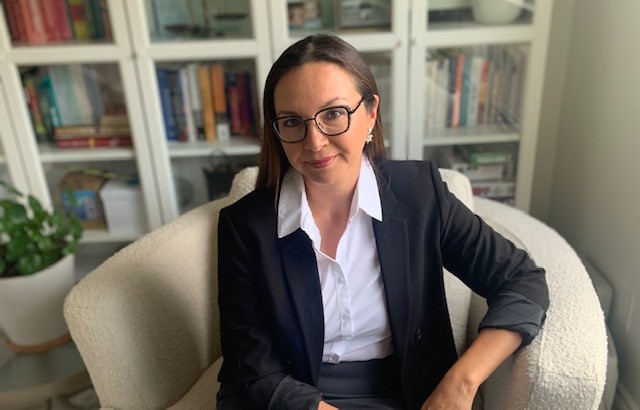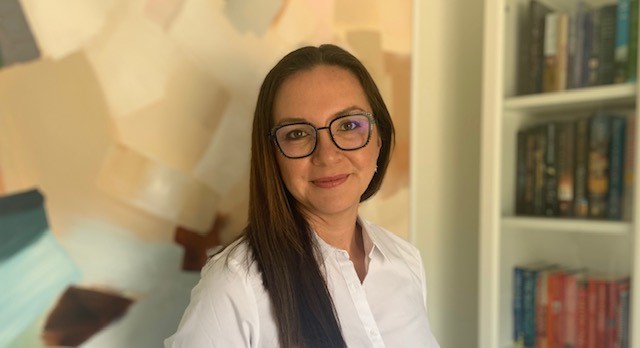
Janesca Kydd officially began her role as General Counsel on June 28, 2021. // Photo credit: Liam Kydd and Finn Kydd
Meet Janesca Kydd, UM’s new top lawyer, dedicated to advancing Reconciliation
Lawyers make the world go ‘round. In a way, they are the “Fifth Business” of daily life, a group of people defined by Robertson Davies in his book by that name as being neither hero nor villain, but crucial to bringing about the denouement. We need them. UM’s Office of Legal Counsel, for instance, represents 9,000 faculty and staff in 23 faculties and schools, managing our risk, defending our reputation, ensuring our partnerships function and our goals are met. And now UM has a new top lawyer: Janesca Kydd, who officially began her role as General Counsel on June 28, 2021.
Her father immigrated from Scotland in the 1950s and then met her mother, a residential school Survivor. And after Kydd was born in Selkirk, Man., the family moved north to run a general store on an island near Misko-ziibiing (Bloodvein First Nation). A few years later they moved to the mainland and after finishing Grade 9, Kydd and her brothers went away for high school because their community’s school went no further than that.
She earned her BA from Carleton University and her Juris Doctor from the University of Toronto before returning to Winnipeg where she practiced law at a large private law firm and then worked in policy development for the provincial government before joining the UM as legal counsel in the Rady Faculty of Health Sciences.
She is passionate about helping UM advance its strategic goals of accessibility, recruitment and retention, and its commitment to the Truth and Reconciliation Commission of Canada (TRC) Calls to Action. And she graciously offered to share some of her thoughts on this with UM Today.
UM Today: In other conversations you have said your life’s history has afforded you some insight and understanding into the various challenges many Manitobans face in pursuing higher education. How in your new role as general counsel are you able to use your office to address some of these challenges?
Janesca Kydd: As I gain more education, I understand the value that it plays in one’s life and how you can create a better life for yourself with the education that you obtain, and I also understand how difficult it is for many individuals because of the struggles to get access. And then once you do in fact have access, what supports are there for you when you enter the doors of an educational institution? It can be difficult enough to complete high school, let alone enter a university. And I think today there are a lot more supports than there were when I was going to university. I’m not saying that makes the process easier, but I think that demonstrates an awareness of the difficulties that surround issues of accessibility and retention in higher education organizations such as the University of Manitoba and that it is something we should continue to monitor and work towards improving.
When I was a student, I think I was more concerned about blending in and not trying to being different. And now, I think, there’s just more of an awareness and bravery to speak up, and any role that I and my legal team can play to make sure that the university is inclusive and respectful, I’m happy to do that. There are a lot of groups here in the university that are doing that work. So, anything that our legal team can do in terms of educating on applicable laws, helping develop policies, and responding to concerns, I think we have a big role to play.
UMT: Lawyers are involved behind the scenes on a lot of processes. Here at the UM, for instance, we have a team of lawyers working on so many issues. How is your team involved in helping the UM incorporate and advance applicable TRC Calls to Action?
JK: I think we all have a responsibility, whether you’re on the legal team or not, to educate ourselves about what the TRC Calls to Action are about and what reconciliation means to us.
Many have written about Indigenous reconciliation and spoken about this complex topic. Although difficult, it is essential for us to consider, discuss, and engage in to move forward as a country and to ensure a more positive, productive and respectful future. I especially liked the explanation provided by Beverley McLachlin, the former Chief Justice of the Supreme Court of Canada in her autobiography, “Truth be Told” – that reconciliation requires us to take painful steps that involve understanding, resolve and action.
I also see reconciliation as a multistep process that begins with acknowledging the harms of the past, and why they happened. It requires one to listen, educate oneself, and reflect.
And secondly, I think you have to be committed to taking action. What does that mean for the Office of Legal Counsel in our role for the university? There is no one way that one is expected to act in terms of commitment. There are many different ways. And I think as a legal team, it depends on what comes through our doors from our clients that we serve, which is all the other units and faculties and administration of the university, and how we can be of assistance. For example, it could be, what kind of policies need to be developed? What legal opinion is required for certain action that is being considered? Is it a curriculum that’s being reviewed, and what are the legalities of implementing change for example or do we need to consider accreditation? So those are some examples that influence broader things. I am grateful to be working with such a great team of lawyers when considering these challenges.
With regard to the third step, acting or action, it can be as small as understanding that certain behaviours or ways of doing things have been influenced by colonial approaches or legacies. It can be an openness to ensuring that there is a safe forum for discussion and assisting in the new narrative that is now taking place. I just think that we can’t be afraid to do or say something, for fear of not being perfect or getting it right, because I think this is new territory.
A couple of podcasts I recently listened to resonated with me when they discussed the issue of fear—of getting it right, or perfectionism—as a notion that should have no place in the public discourse relating to Indigenous reconciliation or matters of equity, diversity and inclusion. Fear holds us back and denies us the right to grow, learn and improve. (The podcasts are called “Show your Work” with Lainey Lui and “Matriarch Movement” with Shayla Oulette Stonechild, by the way.)
If you are scared of making a mistake in your reconciliation efforts, you are failing to recognize the next step of the process, which is regrouping and reflecting upon what we’ve done as we move forward. I don’t see these steps as linear. They should all be kept in mind as we engage in this difficult topic.
Bringing this back to the TRC’s Calls to Action, there are many different ways that we can consider and address them. We don’t just need to focus on ones pertaining to education, for example. But, as an academic, higher education institution, we have a duty to ensure that there is an awareness of all 94 Calls to Action. To ensure we incorporate the various Calls into our various programs and institutional efforts.
There’s a lot of work to be done, and we all have a responsibility as a part of this institution: it doesn’t matter if you’re a learner or a teacher or an administrative support worker. I think this should influence everything we do, every day. Even in the little things.
UMT: When this job was posted you were legal counsel for the Rady Faculty of Health Sciences. What made you want to step up for this new role?
JK: I learned so much from being included on so many different committees, from being able to assist in addressing many different types of legal issues and in participating in the development of many important documents, such as Rady Faculty’s strategic plan, and its Reconciliation Action Plan, and EDI policy. What attracted me to this new role is that the opportunities for learning and growth at the university are endless. I feel that my contributions are valued, and it’s very rewarding.
I value education, very much, and I understand how it can change a person’s life. And I also understand how difficult it is to achieve for so many individuals because of factors that are beyond their control. I feel like we’re in a good position at the university to help break down some barriers and make our place even more inclusive than it has been.
UMT: How about a fun question. Are there any legal TV shows that you enjoy?
JK: A few years back, I was into Suits. I enjoyed that it was a bit of a soap opera.
UMT: Does it bother you that they never have boxes of files in their office?
JK: Yes. Everything is so clean, and everyone looks great even when they’re working at midnight.
UMT: Do you know any lawyer jokes?
JK: None of them are funny.







